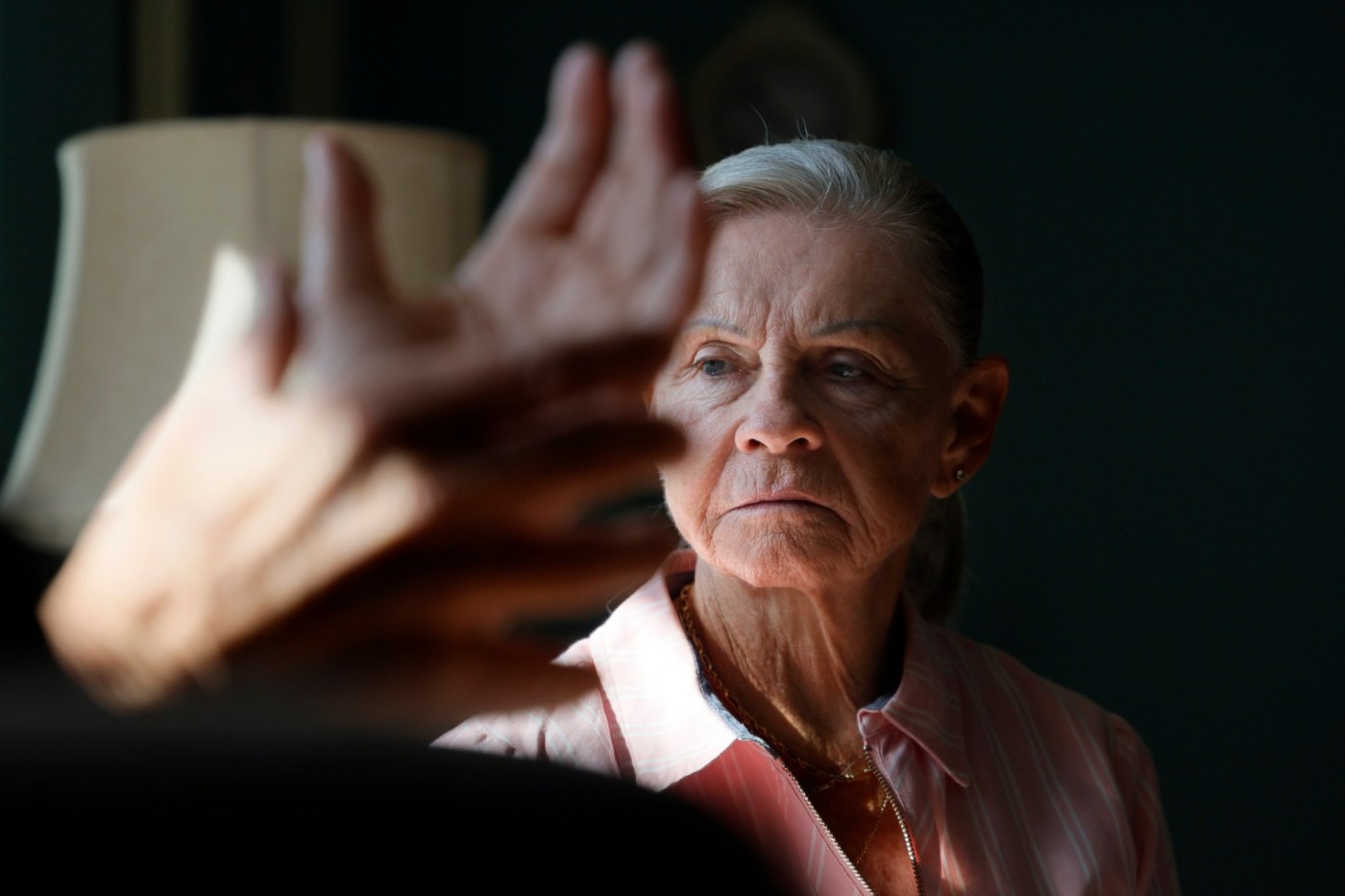“What time is it?” Cheryl Miller asks her husband, John. He wants to answer, but his wife has already asked him that question three times in the last few minutes. Frustrated, John yells at her to stop asking. He instantly regrets it.
“I’m going into the bedroom for a minute,” John tells his wife of 54 years. When he shuts the door, he begins to cry.
Cheryl, 75, has lived with Alzheimer’s disease for nearly five years, but it hasn’t all been bleak. John, 76, said he had some hope for about 18 months when Cheryl was enrolled in a clinical trial for Eil Lilly’s Kisunla, also known as Donanemab. The drug is a monoclonal antibody administered through an IV infusion that targets amyloid plaque in the brain and has been shown in clinical trials to modestly slow memory decline in people with Alzheimer’s disease.
“For those 18 months, there was no regression,” John says. But then, the trial ended, along with Cheryl’s access to the drug. Her disease began to progress again. She would go to the kitchen for a soda in their Singer Island home and return empty-handed or repeat a question John had just answered.
After four months, Cheryl became eligible for another Alzheimer’s clinical trial. John returned with Cheryl to JEM Research in Palm Beach County and enrolled her in a study for a different medication made by Athira Pharma. It required John to give his wife a daily injection at their Palm Beach home. It didn’t go as John had hoped.
“I was beside myself,” John says. “She was getting sores all over and her mind was getting worse. It wasn’t working.”
Researchers took Cheryl off the drug. In September, the manufacturer scrapped its national trial after results showed the medication worked no better than the placebo. Cheryl must now wait four months before enrolling in a new trial. In the meantime, in July, the US Food and Drug Administration cleared Eli Lilly’s Kisunla for use in adults with mild Alzheimer’s disease.
John says he is trying to get insurance coverage so his wife can get back on Kisunla, which can cost as much as $32,000 a year. He also returned to the research lab to seek their help getting coverage and learn about other clinical trials.
“I am not giving up until I know there is no other step,” he says. “Cheryl and I have been together since I was 18 years old. If it were your husband or wife, would you want to try whatever is out there that might work?”
For the spouses who care for a wife or husband with the disease, every day brings a different battle and a new challenge. Every small breakthrough in the Alzheimer’s space offers hope. Every abandoned or failed drug trial leads to despair.
Cheryl Miller, who has been living with Alzheimer’s for nearly five years, looks towards her husband, John, as he talks about being her caretaker in their Singer Island home. (Amy Beth Bennett / South Florida Sun Sentinel)
Available treatments and trials
Throughout Florida, hundreds — possibly thousands — of spouses are riding the highs and lows of Alzheimer’s clinical trials, hoping for the drug instead of the placebo and praying for a positive outcome for their loved one from whatever treatment is being studied. With nearly 7 million people in the U.S., primarily seniors, diagnosed with Alzheimer’s disease, drugmakers are stepping up research efforts for prevention and treatment options.
The National Institute on Aging helps to fund 461 active clinical trials on Alzheimer’s disease and related dementias. The Alzheimer’s Association of Florida has identified ongoing studies for dozens of Alzheimer’s treatments in the state. The trials, of which many are in South Florida, typically require participants to acknowledge potential high-risk side effects and meet the eligibility criteria. Everything — a psychiatric disorder, a visual/hearing impairment, a medical condition requiring blood thinners, and more — could disqualify a potential participant.
In the past few years, some progress has been made in treatment.
In the last two years, the FDA has approved two drugs to slow memory and thinking decline in people with Alzheimer’s disease — not stop it. Both Lecanemab (Leqembi) and Donanemab (Kisunla) target amyloid, one of the proteins that build up in the brain. However, Kisunla is thought to be a little less effective than Leqembi for people who have a lot of tau protein in their brains, which can damage cells. Both medications slow down memory and thinking decline.
“These drugs are not cures and not miracles, but they are the best thing we currently have and a good first step,” said Dr. Mark Goldstein, president of JEM Research Institute in Atlantis, which has numerous clinical trials underway for Alzheimer’s and dementia. “These treatments will be built upon in future months and years and hopefully result in great strides.”
‘Maybe … there will be a cure’
For now, Alzheimer’s disease has no cure, a fact of which John Miller is well aware. Cheryl’s symptoms are getting worse, he says. More repetition. Less reasoning. “She keeps telling me Christmas is over. Put away the decorations,” John says. “I am looking at something to get us from here to there. … maybe down the line there will be a cure.”
John Miller heads out to a medical appointment of his own as his wife, Cheryl, says goodbye in their Singer Island home. Cheryl has been living with Alzheimer’s for nearly five years. (Amy Beth Bennett / South Florida Sun Sentinel)
John stays by Cheryl’s side most of the time, a role of caretaker that he has slowly accepted. Their two adult sons live in New Jersey. John does the cooking, driving, and laundry. Cheryl’s daily tasks are dressing and taking a morning walk.
“I make her stay on Ocean Boulevard and I track her from my phone so that I am not worried,” he says.
Cheryl says can tell she is thinking less clearly. “I try to keep busy and take care of myself,” she says. “When I get overwhelmed, I take a nap.”
Last month, John had a heart attack, which required a cardiologist to insert a stent into his blocked artery.
“I prayed to God to save me so I can take care of Cheryl,” he says. “And he did.”
Tino Negri facilitates an Alzheimer caregiver support group at JEM Research Institute in Atlantis on Nov. 26, 2024. (Carline Jean/South Florida Sun Sentinel)
Grieving a loss that isn’t a death
It’s 4 p.m. on a Tuesday, and Tino Negri stands amid wives, husbands, and partners whose significant others live with Alzheimer’s or other forms of dementia. On this day, Negri welcomes a few newcomers to the caregiver support group at JEM Research. Although Negri runs more than a dozen support groups from Miami-Dade to Palm Beach county, this one is unique because the caregivers’ significant others participate in clinical trials at the research lab.
Bud Collier, 81, sits among the group as a newcomer. His wife, Judy, 85, had been in an Alzheimer’s trial, but after her first infusion, a scan of her brain revealed bleeding and swelling, Bud said. The researchers removed her from the trial. Now, Bud wants to enroll her in another trial, although she must wait the required four months before starting on anything new.
“Seeing her decline and not remember things is very difficult,” Bud tells the group. The Lake Worth Beach couple has been married for 54 years.
Related Articles
States go after ‘claim sharks’ that charge vets for help with disability claims
California reports more illnesses in people who drank raw milk. Here are the risks
Share the Spirit: Turning shelter into homes
How potential Medicaid cuts could play out in California
Weight loss drugs like Ozempic, Wegovy are all the rage. Are they safe for kids?
Negri offers Bud compassion and an understanding of the emotions that he and other life partners experience.
“Everybody, male or female, is grieving,” he says. “You don’t have to lose someone to death to grieve. You are losing the person you love right in front of your face.”
Most caregivers who come to support groups are women, Negri said, adding that men tend to struggle with the role but shy away from seeking support. However, as men and women tell their stories, the nods around the room acknowledge shared experiences.
“A lot of guys love their wives so much and want to do whatever they can to protect them,” he said. “It emotionally gets hard when they don’t know what to do. Being able to express emotions with each other feels good.”
A wife’s perspective
Suzanne O’Brien of Boynton Beach first noticed signs that something was amiss with her husband, Mike, in 2017. The couple had just moved to Florida from New York where Mike had worked as a financial adviser.
“I would ask him to go in the garage to get a ladder and he would come back with a light bulb and not a ladder,” Suzanne says.
A neurologist provided Mike, 65 years old at the time, with a diagnosis: Alzheimer’s disease.
In January 2018, Mike enrolled in Biogen’s trial for aducanumab (Aduhelm), an experimental drug intended to reduce plaque buildup in the brain. What followed was a series of ups and downs that tested Suzanne’s resilience.
“We knew he was getting the top dose because the researchers found he had some brain bleeds,” she says. During the trial, brain bleeds became a controversial side effect that led to the FDA updating the label to include the risk.
“He went off the drug for two months and then had a scan of his brain,” Suzanne says. “It showed he was fine, so he went back on it for a year. We could tell it was making a difference. His brain fog lifted, and he was not as confused.
“The thing is with Alzheimer’s, you have a death sentence. What was our choice? Either do nothing or do something where we might have a chance of doing something to help this disease,” Suzanne says. “It might not be in our lifetime, but it might help our kids or grandkids.”
However, in January 2024, Biogen announced it was discontinuing its aducanumab trial and shifting resources to its other Alzheimer’s medications, including Leqembi.
The O’Briens were devastated.
Suzanne urged researchers to enroll her husband in the Leqembi trial. But in the months after the original trial, Mike had developed a heart condition called atrial fibrillation and a cardiologist put him on blood thinners. That prevented him from entering the Leqembi trial.
When the FDA approved Leqembi in July 2023, Suzanne took Mike to a new neurologist to coax him to put her husband on the drug. “We were even willing to pay out of pocket,” she said. “But when he went for a PET scan, they found he had no more amyloid plague in his brain, so that disqualified him.”
“Now he is on nothing and I am scared. I am scared every day. Nobody knows how long it will take for him to start developing plaque again,” she says.
Like others, Suzanne has changed her behavior to adjust to her situation.
She leaves Post-It notes on the counter, the refrigerator, and the dresser. “They will say ‘Sue is getting her nails done’ or ‘Sue is out to lunch’ so he knows where I am and what I am doing,” Suzanne says. “He is forgetful and I know he will never regain that part of the brain back.”
Suzanne said her husband socializes with neighbors, does word searches and exercises daily. But he can no longer drive because of his slow reaction time and he gets mixed up easily. “I can’t trust him to go to the bathroom in a public place,” she says. “I am right there when he comes out.”
Tears, fear, and hope have marked the couple’s last seven years, she says.
“Right now, I am holding on to hope that he will continue the way he is now for the rest of his life.”
Both spouses are in a trial; one gets a placebo
“Cancer is a devastating disease, but I think right next to that is Alzheimer’s,” says Duane Williams, whose wife Jacqualin learned in January 2023 that she had a buildup of abnormal tau protein, a hallmark of Alzheimer’s disease.
Now, Jacqualin, 80, is in a clinical trial for an investigational medication targeting tau. The couple from Altamonte Springs drive to Palm Beach County to participate.
“Her Alzheimer’s is mild at this point and I have hope that we caught it early,” Duane says. “I think she is getting the active medication because there is some indication she is improving.”
Jacqualin said her energy level was low before getting into the trial. “I felt like my brain was foggy,” she says. Now, after 24 monthly infusions, she says she feels more aware and able to participate in conversations.
“She requires a bit more caretaking from me,” Duane, 80, says. “But we are a little more hopeful.”
While taking her to appointments, Duane, who works full-time at the front desk of Seminole County Sheriff’s Office, agreed to get tested for the disease. A brain scan revealed he had a buildup of amyloid plaque. That made him eligible for a clinical trial, too. He gets an infusion every two weeks with a drug made by Eli Lilly.
Duane, however, believes he is getting a placebo. “I don’t see a difference, but who knows?”
Still, both Williams say they want to participate in research that could help others and postpone their potential memory and cognitive thinking decline.
“There is nothing worse than reaching 80 and having fear that your kids will have to take care of you for many years before you die,” Duane says.
Sun Sentinel health reporter Cindy Goodman can be reached at cgoodman@sunsentinel.com.












